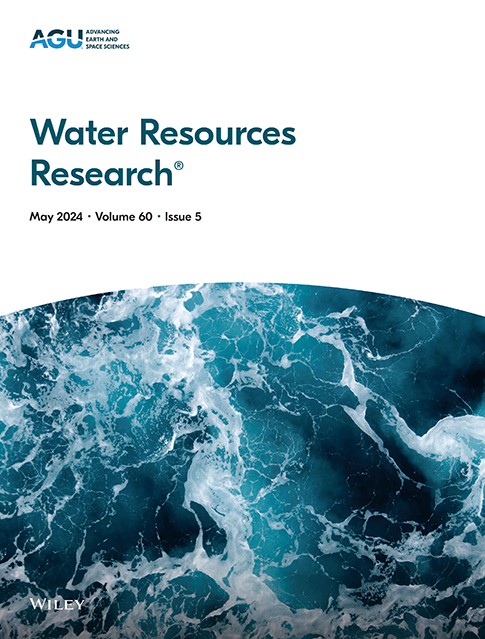Extending GLUE With Multilevel Methods to Accelerate Statistical Inversion of Hydrological Models
IF 4.6
1区 地球科学
Q2 ENVIRONMENTAL SCIENCES
引用次数: 0
Abstract
Inverse problems aim at determining model parameters that produce observed data to subsequently understand, predict or manage hydrological or other environmental systems. While statistical inversion is especially popular, its sampling-based nature often inhibits its application to computationally costly models, which has compromised the use of the Generalized Likelihood Uncertainty Estimation (GLUE) methodology, for example, for spatially distributed (partial) differential equation based models. In this study we introduce multilevel GLUE (MLGLUE), which alleviates the computational burden of statistical inversion by utilizing a hierarchy of model resolutions. Inspired by multilevel Monte Carlo, most parameter samples are evaluated on lower levels with computationally cheap low-resolution models and only samples associated with a likelihood above a certain threshold are subsequently passed to higher levels with costly high-resolution models for evaluation. Inferences are made at the level of the highest-resolution model but substantial computational savings are achieved by discarding samples with low likelihood already on levels with low resolution and low computational cost. Two example inverse problems, using a rainfall-runoff model and groundwater flow model, demonstrate the substantially increased computational efficiency of MLGLUE compared to GLUE as well as the similarity of inversion results. Findings are furthermore compared to inversion results from Markov-chain Monte Carlo (MCMC) and multilevel delayed acceptance MCMC, a corresponding multilevel variant, to compare the effects of the multilevel extension. All examples demonstrate the wide-range suitability of the approach and include guidelines for practical applications.用多层次方法扩展 GLUE,加速水文模型的统计反演
反演问题旨在确定产生观测数据的模型参数,以便随后了解、预测或管理水文或其他环境系统。虽然统计反演特别流行,但其基于采样的性质往往阻碍其应用于计算成本高昂的模型,这就影响了广义似然不确定性估计(GLUE)方法的使用,例如,用于基于空间分布(偏微分方程)的模型。在这项研究中,我们引入了多层次 GLUE(MLGLUE),通过利用模型分辨率的层次结构来减轻统计反演的计算负担。受多级蒙特卡洛的启发,大多数参数样本都在较低级别的低分辨率模型上进行评估,只有相关似然超过一定阈值的样本才会被传递到较高级别的高分辨率模型上进行评估。推论是在最高分辨率模型的层次上进行的,但通过舍弃已经在低分辨率和低计算成本层次上的低似然样本,可以大大节省计算量。使用降雨-径流模型和地下水流模型的两个反演问题实例表明,与 GLUE 相比,MLGLUE 的计算效率大大提高,反演结果也很相似。此外,研究结果还与马尔可夫链蒙特卡罗(MCMC)和多级延迟接受 MCMC(一种相应的多级变体)的反演结果进行了比较,以比较多级扩展的效果。所有示例都证明了该方法的广泛适用性,并包括实际应用指南。
本文章由计算机程序翻译,如有差异,请以英文原文为准。
求助全文
约1分钟内获得全文
求助全文
来源期刊

Water Resources Research
环境科学-湖沼学
CiteScore
8.80
自引率
13.00%
发文量
599
审稿时长
3.5 months
期刊介绍:
Water Resources Research (WRR) is an interdisciplinary journal that focuses on hydrology and water resources. It publishes original research in the natural and social sciences of water. It emphasizes the role of water in the Earth system, including physical, chemical, biological, and ecological processes in water resources research and management, including social, policy, and public health implications. It encompasses observational, experimental, theoretical, analytical, numerical, and data-driven approaches that advance the science of water and its management. Submissions are evaluated for their novelty, accuracy, significance, and broader implications of the findings.
 求助内容:
求助内容: 应助结果提醒方式:
应助结果提醒方式:


